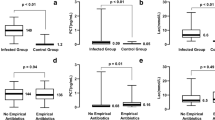Abstract
Acute bacterial meningitis is rare, but can be fulminant unless rapidly evaluated and treated. The aim of this study was to evaluate whether serum procalcitonin (PCT) levels could predict unfavorable outcomes of bacterial meningitis. We retrospectively reviewed the medical records of 604 meningitis patients from the emergency department (ED) of our tertiary care, university-affiliated hospital over a five-year period. We analyzed the ability of blood PCT levels on admission to predict the outcome at discharge (defined as Glasgow Outcome Scale scores of 1–4). Of 71 patients with acute bacterial meningitis, 28 (39 %) experienced an unfavorable outcome at discharge (overall mortality: 5 %). The serum PCT level at admission was a predictive indicator of an unfavorable outcome [adjusted odds ratio: 1.04, 95 % confidence interval (CI) 1.01–1.09, p = 0.05]. As assessed using receiver operating characteristic curves for an unfavorable outcome, the area under the PCT curve was 0.708 (95 % CI 0.58–0.84, p < 0.01). When the PCT cutoff value was ≥1.10 ng/mL, the sensitivity, specificity, positive predictive value and negative predictive value for an unfavorable outcome were 75, 70, 62, and 81 %, respectively. An association between the serum PCT level and an unfavorable outcome is observed.


Similar content being viewed by others
Abbreviations
- CSF:
-
Cerebrospinal fluid
- ED:
-
Emergency department
- GOS:
-
Glasgow outcome scale
- IQR:
-
Interquartile range
- PCT:
-
Procalcitonin
References
Schut ES, de Gans J, van de Beek D (2008) Community-acquired bacterial meningitis in adults. Pract Neurol 8:8–23
Glimåker M, Johansson B, Grindborg Ö, Bottai M, Lindquist L, Sjölin J (2015) Adult bacterial meningitis: earlier treatment and improved outcome following guideline revision promoting prompt lumbar puncture. Clin Infect Dis 60(8):1162–1169. doi:10.1093/cid/civ011
Van de Beek D, de Gans J, Spanjaard L, Weisfelt M, Reitsma JB, Vermeulen M (2004) Clinical features and prognostic factors in adults with bacterial meningitis. N Engl J Med 351:1849–1859
Weisfelt M, van de Beek D, Spanjaard L, Reitsma JB, de Gans J (2008) A risk score for unfavorable outcome in adults with bacterial meningitis. Ann Neurol 63:90–97. doi:10.1002/ana.21216
Liu D, Su L, Han G, Yan P, Xie L (2015) Prognostic value of procalcitonin in adult patients with sepsis: a systematic review and meta-analysis. PLoS One 10:e0129450. doi:10.1371/journal.pone.0129450
Mary R, Veinberg F, Couderc R (2003) Acute meningitis, acute phase proteins and procalcitonin. Ann Biol Clin (Paris) 61:127–137
Umran RM, Radhi NH (2014) Diagnostic value of serum procalcitonin level in differentiating bacterial from nonbacterial meningitis in children. Iran J Pediatr 24:739–744
Viallon A, Zeni F, Lambert C, Pozzetto B, Tardy B, Venet C, Bertrand JC (1999) High sensitivity and specificity of serum procalcitonin levels in adults with bacterial meningitis. Clin Infect Dis 28:1313–1316. doi:10.1086/514793
Jereb M, Muzlovic I, Hojker S, Strle F (2001) Predictive value of serum and cerebrospinal fluid procalcitonin levels for the diagnosis of bacterial meningitis. Infection 29:209–212
Vikse J, Henry BM, Roy J, Ramakrishnan PK, Tomaszewski KA, Walocha JA (2015) The role of serum procalcitonin in the diagnosis of bacterial meningitis in adults: a systematic review and meta-analysis. Int J Infect Dis 38:68–76. doi:10.1016/j.ijid.2015.07.011
Dzupova O, Rozsypal H, Prochazka B, Benes J (2009) Acute bacterial meningitis in adults: predictors of outcome. Scand J Infect Dis 41:348–354. doi:10.1080/00365540902849391
Aronin SI, Peduzzi P, Quagliarello VJ (1998) Community-acquired bacterial meningitis: risk stratification for adverse clinical outcome and effect of antibiotic timing. Ann Intern Med 129:862–869
Glimaker M, Johansson B, Bell M, Ericsson M, Blackberg J, Brink M, Lindquist L, Sjolin J (2013) Early lumbar puncture in adult bacterial meningitis–rationale for revised guidelines. Scand J Infect Dis 45:657–663. doi:10.3109/00365548.2013.799289
Koster-Rasmussen R, Korshin A, Meyer CN (2008) Antibiotic treatment delay and outcome in acute bacterial meningitis. J Infect 57:449–454. doi:10.1016/j.jinf.2008.09.033
Lepur D, Barsic B (2007) Community-acquired bacterial meningitis in adults: antibiotic timing in disease course and outcome. Infection 35:225–231. doi:10.1007/s15010-007-6202-0
Proulx N, Frechette D, Toye B, Chan J, Kravcik S (2005) Delays in the administration of antibiotics are associated with mortality from adult acute bacterial meningitis. QJM 98:291–298. doi:10.1093/qjmed/hci047
Schwarz S, Bertram M, Schwab S, Andrassy K, Hacke W (2000) Serum procalcitonin levels in bacterial and abacterial meningitis. Crit Care Med 28:1828–1832
Glimaker M, Johansson B, Grindborg O, Bottai M, Lindquist L, Sjolin J (2015) Adult bacterial meningitis: earlier treatment and improved outcome following guideline revision promoting prompt lumbar puncture. Clin Infect Dis 60:1162–1169. doi:10.1093/cid/civ011
Hu R, Gong Y, Wang Y (2015) Relationship of Serum Procalcitonin Levels to Severity and Prognosis in Pediatric Bacterial Meningitis. Clin Pediatr (Phila). doi:10.1177/0009922815569203
Ibrahim KA, Abdel-Wahab AA, Ibrahim AS (2011) Diagnostic value of serum procalcitonin levels in children with meningitis: a comparison with blood leukocyte count and C-reactive protein. J Pak Med Assoc 61:346–351
Author information
Authors and Affiliations
Corresponding author
Ethics declarations
Conflict of interest
The authors declare that they have no conflict of interest.
Human and animal rights statement
All procedures performed in studies involving human participants were in accordance with the ethical standards of the institutional or national research committees and with the 1964 Declaration of Helsinki and its later amendments, or comparable ethical standards. This article does not contain any studies with human participants or animals performed by any of the authors.
Informed consent
None.
Funding
The authors declare that they had no funding source.
Rights and permissions
About this article
Cite this article
Ko, B.S., Ryoo, S.M., Ahn, S. et al. Usefulness of procalcitonin level as an outcome predictor of adult bacterial meningitis. Intern Emerg Med 12, 1003–1009 (2017). https://doi.org/10.1007/s11739-016-1509-4
Received:
Accepted:
Published:
Issue Date:
DOI: https://doi.org/10.1007/s11739-016-1509-4




